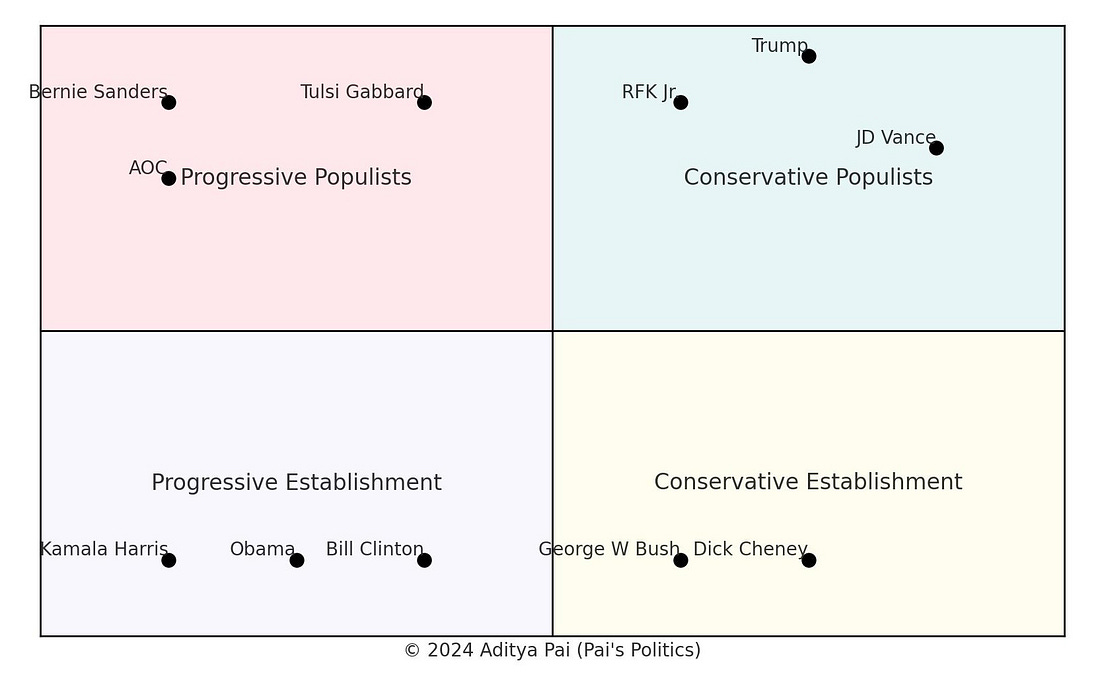|
The presidential race is about populism vs. the establishment, not D vs. R.
Once you notice this, everything makes more sense. And it may even affect how you vote.
Some friends recently have asked me, how could Dick and Liz Cheney endorse Harris, though they oppose virtually all of her policy positions? And how could Tulsi Gabbard, who used to be a Democrat, and RFK Jr., scion of the most famous Democratic family in American history, align with Trump?
The answer is simple: the Cheneys and Harris are pro-establishment; Trump, Gabbard, and Kennedy are anti-establishment populists.
National politics today is governed by two axes (see above):
The X-axis: left vs. right.
The Y-axis: populism vs. the establishment
The X-axis gets all the explicit, conscious attention. But it misses most of what is actually going on right now. And, I promise you, it will not determine who becomes the next president of the United States.
Far more important is the implicit, subconscious Y-axis of American politics: anti-establishment vs pro-establishment sentiment. It drives the MAGA movement and much of what we have since in U.S. politics since 2015.
What is ‘the establishment’?
The establishment is a school of thought, not a group of people. It is the philosophy that America’s institutions are fundamentally trustworthy — and work. That the government has your best interests at heart, and spends money well, so paying taxes is inherently good and spending — especially defense spending — is noble. That journalists are honest, decent, public-spirited and trying to tell you the truth.
Establishment thinkers believe the economy is doing well and Americans have never had a higher standard of living than we do today. Sure, America has poverty and serious problems; but Trump would destroy whatever good things we have going, and make our problems even worse — not better. We must support Israel and Ukraine in their hour of need in battles that are both necessary and just.
That is why, even if you are a Republican, you must set aside your policy differences and vote for Harris. Trump is an ‘existential threat to democracy’ and ‘the post-WWII global order.’ He is ‘weird.’ You should vote for democracy and for ‘joy’ because ‘we are not going back.’
What is ‘populism’?
Populism rejects all of these claims. Elections don’t matter as much as you think, the populists say, because the donor class selects the candidates anyway; we live in an oligarchy (rule by wealthy elites), not a democracy (rule by the demos, or masses). That is why Bernie lost twice and Trump barely won once. And it is why the rich get richer while everyday Americans struggle to pay for groceries or buy a home.
After Korea, Vietnam, Iraq, Afghanistan, and ‘the forever wars’ now brewing in the Middle East and Ukraine, the populists argue, we must reject the notion that government spending - especially defense spending - is inherently noble.
The media deliberately lied to you by, first, claiming for years that a dementia-addled president was perfectly healthy, until he visibly wasn’t; and second, by telling you that democracy means nominating a historically unpopular vice-president who lost the 2019 Democratic primary, badly; has not earned a single vote for her 2024 nomination; and now hopes to be elected after doing 1 interview, 0 press conferences, and 1 debate.
Most of all, populists have zero trust in the federal government as constituted - and believe that career politicians in both parties are bought and paid for by corporations, foreign agents, and a ‘globalist elite’ who will always put America last. You should vote for Trump because he will ‘put America first.’
The real realignment
This is a realignment election, but not along the X-axis of left vs. right / Democrat vs. Republican. It is not about guns, abortion, immigration, foreign wars, crime, inflation or any one policy issue, though they will all factor into the outcome. It is about where you fall on the Y-axis of American politics:
If you believe (1) politics as practiced today is the solution to America’s problems, (2) we live in a democracy (3) and Trump is a dangerous threat to it, you will eventually vote for Harris, whatever her obvious flaws. You are an Establishment Thinker.
If you believe (1) politics is the problem, (2) we live in an oligarchy, and (3) Harris is its appointed puppet, then you will end up voting for Trump, despite the obvious risks. You are an Anti-Establishment Thinker.
And if you’re uncertain about this question, then you are undecided, a third-party voter, or simply will not vote.
In any case, the most significant issue in this election is not related to policy, personality, or even the #vibes.
The number one issue in this election is your underlying attitude toward politics itself.
